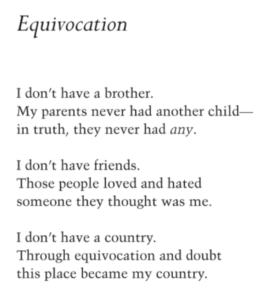- Facebook28
- Twitter1
- Total 29

(Translated by Kareem James Abu-Zeid, from Najwan Darwish, Exhausted on the Cross, NYRB Books 2021.)
I don’t know the Arabic word that is the title of this poem. The English word can mean a logical fallacy–changing the meaning of a term between one part of an argument and another–or a deliberate trick. Macbeth calls a promise “that lies like truth” “th’Equiuocation of the Fiend.”
Deceit is a fault, but equivocation can also imply an inability to decide, or even a choice to remain undecided, like Keats’ “capab[ility] of being in uncertainties, Mysteries, doubts. …” One can equivocate because several options seem attractive, or because all seem terrible.
I read Darwish as self-critical. He is confessing his equivocation, his failure (sometimes) to take a stand, much as, in “In Shatila,” he asks himself how he could have turned smilingly away from an old refugee:
How could you smile, indifferent to the brackish water of the sea while barbed wire wrapped around your heart? How could you, you son of a bitch?
But what should be expected of him? At a time when everyone is supposed to take one side, to state one truth–when we are all our own communications departments, and silence is called complicity–I resonate with the poet’s equivocation. His uncertainty becomes a doubt about who he is, and that doubt becomes the country he dwells in, wherever he goes. It’s the only country he has.
(By the way, I have no idea whether Darwish feels equivocal today, and I don’t mean to attribute any stance to him in this moment. The poem is several years old. It does speak to me today.)